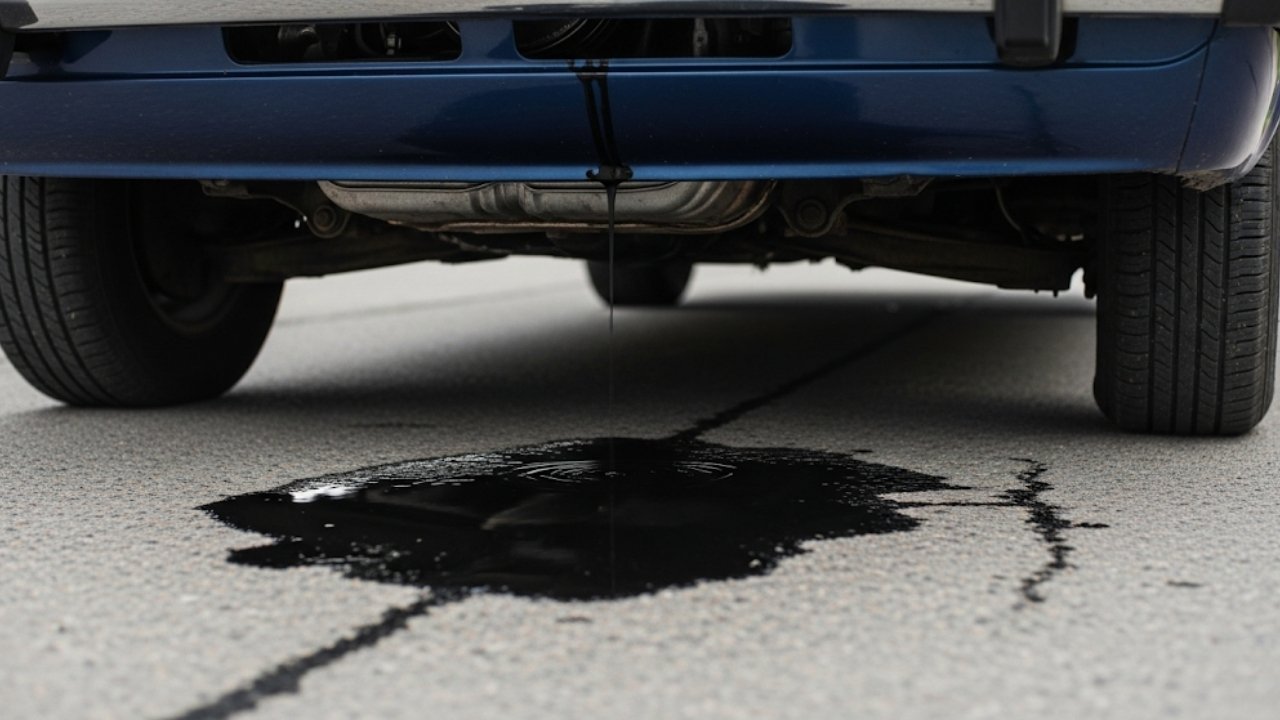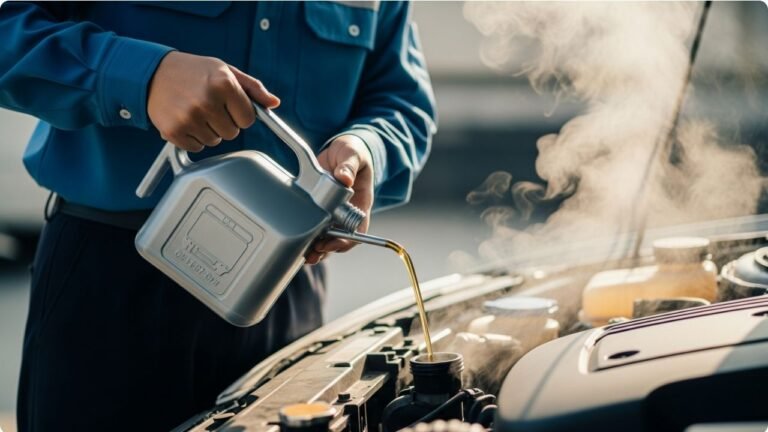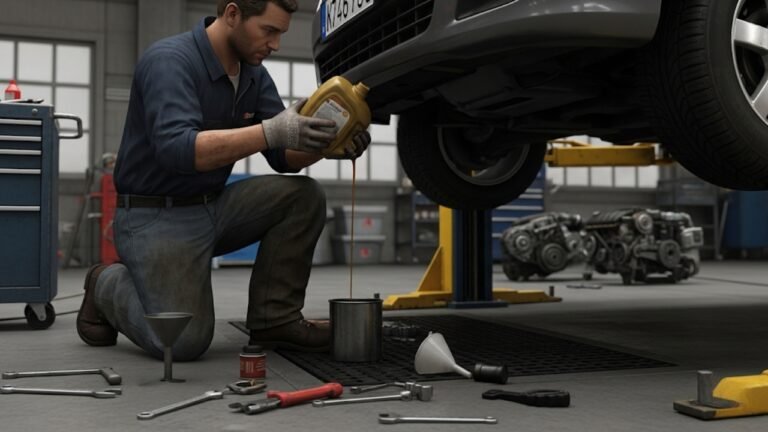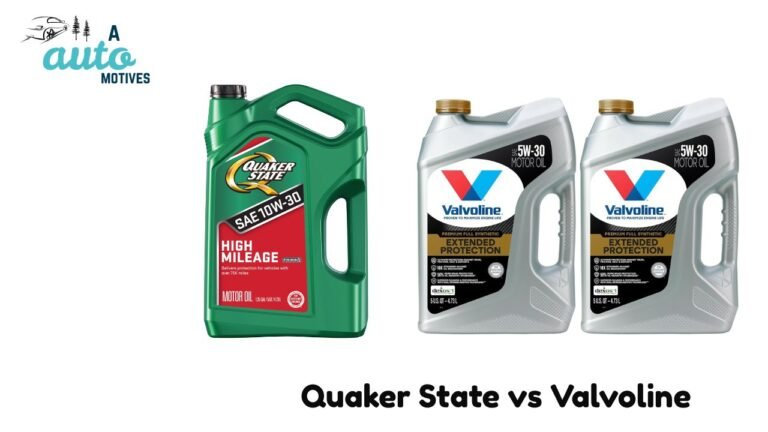My Car Is Leaking Oil: What It Means and How to Fix It

Ever walked out to your car, coffee in one hand, ready to take on the day — only to spot a dark, shiny puddle under your vehicle? Your heart sinks. “My car is leaking oil,” you mutter, trying not to panic. It’s a moment every car owner dreads.
I’ve been there. That first oil leak on my old Honda Civic made me feel like the car was bleeding — literally. And while it might seem like just a small drip, ignoring it can turn into a wallet-crushing mistake. Whether it’s a few spots or a full-blown puddle, oil leaks can signal deeper issues.
Let’s dive into what causes them, how serious they are, and what you can do to fix it without losing your mind (or your paycheck).
In This Article
- 1 How to Identify If Your Car Is Really Leaking Oil
- 2 Why Is My Car Leaking Oil? The 7 Most Common Causes
- 3 Worn-Out Gaskets: Silent Troublemakers
- 4 The Oil Pan: Taking Hits from Below
- 5 Oil Drain Plug or Filter Issues After an Oil Change
- 6 Is It Dangerous If My Car Is Leaking Oil?
- 7 What Should I Do If My Car Is Leaking Oil?
- 8 Preventing Oil Leaks: Small Habits, Big Rewards
- 9 Can I Drive If My Car Is Leaking Oil?
- 10 Fixing an Oil Leak: DIY vs. Professional Repair
- 11 The Hidden Costs of Ignoring an Oil Leak
- 12 How to Tell If the Leak Has Been Fixed
- 13 Common Myths About Oil Leaks (Debunked)
- 14 Frequently Asked Questions (FAQs)
- 14.1 1. Can I still drive my car if it’s leaking oil?
- 14.2 2. How much does it cost to fix an oil leak?
- 14.3 3. Will my car fail inspection because of an oil leak?
- 14.4 4. Do oil leaks get worse over time?
- 14.5 5. Can I use stop-leak additives?
- 14.6 6. How do I know if it’s oil or another fluid leaking?
- 14.7 7. How do I prevent future oil leaks?
- 15 Final Thoughts: Don’t Ignore the Drip
How to Identify If Your Car Is Really Leaking Oil

Look for These Signs:
-
Color: Oil is usually brown, amber, or black depending on age.
-
Smell: Old engine oil has a distinct burnt or mechanical scent.
-
Texture: It’s slick, greasy, and leaves stains.
-
Location: Most leaks appear under the engine or near the front bumper.
Quick Tip:
Put a clean cardboard sheet under your car overnight. Check the spot the next morning to confirm the leak source.
If you’re constantly thinking, “My car is leaking oil,” trust your instincts. You’re likely right.
Why Is My Car Leaking Oil? The 7 Most Common Causes
Understanding the root of the issue helps prevent future leaks. Here are the usual suspects:
| Cause | Description |
|---|---|
| Worn-Out Gaskets | Gaskets seal engine parts. When they crack, oil escapes. |
| Oil Pan Damage | Rocks, road debris, or potholes can puncture the oil pan. |
| Loose or Damaged Drain Plug | After an oil change, a loose plug can cause leaks. |
| Cracked Valve Cover Gasket | High engine heat can warp this gasket over time. |
| Faulty Oil Filter | An improperly installed or old oil filter leaks around the base. |
| Oil Filler Cap Issues | A loose or broken cap allows oil to spill when the engine is running. |
| Excess Oil in the Engine | Overfilling can cause pressure build-up, forcing oil out. |
Each of these deserves a deeper look. Let’s explore a few.
Worn-Out Gaskets: Silent Troublemakers
When someone tells me “my car is leaking oil”, the valve cover gasket is one of the first things I ask about. It’s one of the most overlooked components in the engine.
Over time, heat from your engine can make the gasket brittle or cracked. It then fails to seal the oil inside, and gravity does the rest — drip, drip, drip onto your driveway. If you smell burning oil when you drive, it’s a warning sign that oil is leaking onto hot engine parts.
Pro Tip: Replacing a valve cover gasket is not too expensive — usually between $100 to $300 at most garages.
The Oil Pan: Taking Hits from Below
Think of your oil pan like the belly of a turtle. It’s always exposed to the ground, and if you hit a speed bump too hard or a rock bounces up, it might crack the pan. That’s a direct route for oil to spill out.
If you’re noticing a large pool of oil overnight, this could be the culprit. In my case, it was a hidden hairline fracture I never noticed until I got under the car with a flashlight.
Replacing an oil pan can cost between $250–$600 depending on your car model and labor.
Oil Drain Plug or Filter Issues After an Oil Change
After an oil change, you expect everything to be smooth. But sometimes the mechanic might not tighten the drain plug properly. Or they may use the wrong oil filter size. This creates a sneaky leak that starts slow and worsens with time.
You might notice the smell of oil while driving or see small drops every morning. Don’t ignore it.
Check immediately after an oil change. If something doesn’t feel right, go back to the shop.
Is It Dangerous If My Car Is Leaking Oil?
Yes — even a small leak can become dangerous if left alone.
-
Low oil levels can cause the engine to overheat and seize.
-
Oil on hot parts can start a fire (yes, it happens).
-
Oil leaking onto belts can cause them to slip or break.
-
Leaks can destroy rubber seals, leading to more damage.
Think of oil as the lifeblood of your engine. If it’s escaping, the heart suffers.
What Should I Do If My Car Is Leaking Oil?
Before panic sets in, take a deep breath. Here’s what you can do next:
Immediate Actions:
-
Check the oil level using the dipstick.
-
Top off the oil if it’s low.
-
Clean the area around the leak to better identify the source.
-
Use UV dye leak detection kits (available at auto stores).
Visit a Mechanic If:
-
The leak is more than a few drops per day.
-
There’s a burning smell from the engine.
-
You hear knocking noises or see the oil warning light.
Preventing Oil Leaks: Small Habits, Big Rewards
Oil leaks can often be prevented. A little extra attention can go a long way.
Helpful Habits:
-
Always check under your car once a week.
-
Don’t skip oil changes — and always use the correct oil type.
-
Ask mechanics to inspect gaskets and seals during routine service.
-
Avoid overfilling oil — follow the dipstick’s level strictly.
I started doing this after my second leak. It saved me hundreds in repairs.
Can I Drive If My Car Is Leaking Oil?
This is one of the most common questions I hear — and I’ve asked it myself. The short answer? It depends.
If the leak is minor, like a few drops a day, and your oil levels stay within range, you can drive short distances. But if you’re topping off oil more than once a week, you’re taking a risk.
Driving with a leak can cause:
-
Oil starvation, which means your engine parts grind against each other.
-
Overheating, because oil also helps cool the engine.
-
Sudden engine failure, especially at highway speeds.
I once drove 15 miles on low oil during summer. Big mistake. The engine ran hot, and the repair cost nearly totaled the car.
Bottom line: Check your oil level and get the leak diagnosed as soon as possible. If the oil warning light comes on, pull over immediately.
Fixing an Oil Leak: DIY vs. Professional Repair
So now you’re thinking, “Can I fix it myself?” Let’s break it down.
DIY Repairs (Good for Small Leaks):
-
Tightening the oil drain plug
-
Replacing a faulty oil cap or filter
-
Using oil stop-leak products (temporary solution only)
-
Changing easily accessible gaskets
Tools Needed:
-
Wrench set
-
Oil catch pan
-
Rubber gloves
-
Flashlight
-
Jack and jack stands (for underneath access)
Be honest about your skills. If you’re comfortable with basic tools, try a small fix. If not, it’s better to let a mechanic handle it.
When to See a Mechanic:
-
If the leak is under the engine
-
If it’s constant or heavy
-
If you see blue smoke from the exhaust
-
If oil is dripping while the engine is off
Expect to pay anywhere from $150 to over $1,000, depending on the problem.
The Hidden Costs of Ignoring an Oil Leak
Here’s the thing — oil leaks are like termites. You don’t always see the full damage until it’s too late. Ignoring even a tiny leak can lead to:
-
Engine rebuilds or replacements ($3,000+)
-
Catalytic converter damage
-
Environmental fines in states with strict EPA rules
-
Failed emissions tests
And let’s not forget — it’s bad for the environment. Leaking oil seeps into the ground and contaminates water sources. Not cool.
How to Tell If the Leak Has Been Fixed
After repairs, don’t just assume it’s over. Test and observe.
Post-Repair Checklist:
-
Monitor your oil levels daily for a week.
-
Check for new puddles or stains.
-
Smell for burning oil after driving.
-
Clean the bottom of the engine — so you can see any new leaks clearly.
I also suggest keeping a small notebook where you track your oil top-offs and observations. It sounds nerdy, but it helps spot patterns early.
Common Myths About Oil Leaks (Debunked)
Let’s bust a few misconceptions:
-
“A little oil leak is nothing.”
➤ False. Even small leaks can lead to big engine problems. -
“Stop-leak products are a permanent fix.”
➤ False. They only work short-term and can clog engine passages. -
“Synthetic oil leaks more.”
➤ Partly true. It can expose existing gasket weaknesses, but it doesn’t cause leaks. -
“Older cars always leak oil.”
➤ False. Age doesn’t mean leaks are normal. Maintenance is key.
Frequently Asked Questions (FAQs)
1. Can I still drive my car if it’s leaking oil?
Yes, but only short distances and if the leak is minor. Check your oil regularly, and avoid driving if the oil light comes on.
2. How much does it cost to fix an oil leak?
It can range from $150 to $1,200, depending on whether it’s a gasket, oil pan, or engine seal issue.
3. Will my car fail inspection because of an oil leak?
In some states, yes. Especially if the leak is visible or contaminating the undercarriage.
4. Do oil leaks get worse over time?
Absolutely. Heat, vibration, and pressure make leaks worse. What starts as a drip can become a gush.
5. Can I use stop-leak additives?
You can, but only as a temporary solution. It’s not a fix — more like a bandage on a cut that needs stitches.
6. How do I know if it’s oil or another fluid leaking?
Oil is usually brown or black, smells burnt, and feels slick. Coolant is often green or orange and smells sweet.
7. How do I prevent future oil leaks?
Regular maintenance, oil changes with the right type, checking seals during inspections, and not overfilling oil.
Final Thoughts: Don’t Ignore the Drip
When I first thought, “my car is leaking oil,” I didn’t think much of it. But a few months later, I was stranded with a seized engine and a $2,400 repair bill. I learned the hard way.
Oil leaks are more than messy. They’re a warning sign — and they’re often fixable if you act quickly.
So don’t wait. Take that puddle seriously. Look under your car, check your oil level, and book an appointment if you’re unsure. It’s one of those things where being proactive saves you money, time, and a whole lot of stress.






